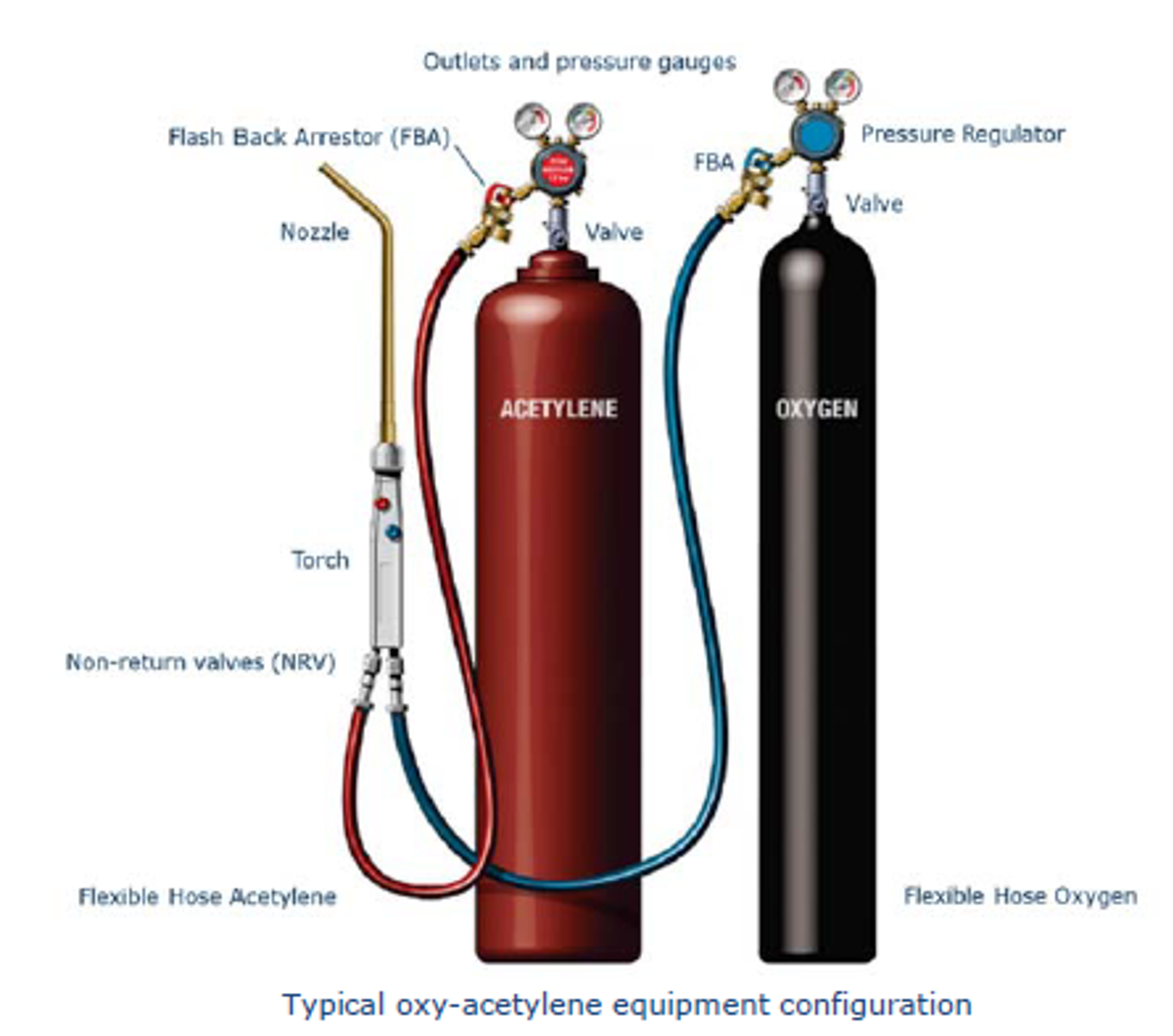Ruptured acetylene hose: Fire
- Safety Flash
- Published on 28 October 2019
- Generated on 14 July 2025
- IMCA SF 25/19
- 3 minute read
Jump to:
A subcontractor was preparing to use an oxy-acetylene torch on the back deck of a vessel.
What happened?
The oxygen and acetylene cylinders were located on the quayside with the hoses rigged to the vessel. On lighting the torch, a ‘pop’ sound was heard, and a small fire was observed from a rupture of the acetylene hose just ahead of the flash-back arrestor.

What went wrong?
The actual cause of this incident could not be established. However, flash-back can occur when a flammable mixture remains in the blowpipe or hoses when the torch is lit.
Ignition can travel towards the cylinder but is normally stopped by the flash-back arrestor, which prevents decomposition of the acetylene or an explosion.
What actions were taken?
Our Member took the following actions:
- Regularly check the condition of oxygen and acetylene hoses and ensure they are replaced as required in any planned maintenance system (PMS) or supplier instructions.
- Keep torches in good condition to avoid turbulent gas flow and so reduce the risk of flash-back.
- As a minimum there should be a non-return valve at the torch end of each hose and a pressure or temperature variation activated flash-back arrestor at the cylinder end.
- Only use regulators, flash-back arrestors, hoses and blowpipes which are designed for either acetylene or oxygen and are clearly marked and manufactured to the correct standard.
- Ensure that flash-back arrestors are being replaced at least every 12-months.
- Welding gas hoses should be correctly connected, and jubilee clips should never be used.
- For cutting and purging operations the oxygen and acetylene hoses should be separately purged to remove any flammable mixtures before lighting the blowpipe.
- Monitor and confirm the subcontractor’s compliance to the above requirements.
What lessons were learned?
Our Member gave the following advice to crew for what to do if a flash-back occurs and it is safe to do so:
- Immediately close the oxygen nozzle valve and then the acetylene nozzle valve (NB: This is the opposite of the normal closing down sequence).
- Close both oxygen and acetylene cylinder valves.
- If the flame cannot be put out at once, evacuate the area and raise the alarm. For onshore sites or for a vessel which is alongside alert the emergency services.
- Once the situation is secured, the equipment must be quarantined until it can be fully examined for damage and either confirmed safe for reuse or safely disposed of.
- Never attempt to move or vent a cylinder but monitor for any heat generation.
- If a hotspot is detected on the acetylene cylinder, evacuate the area, raise the alarm and where appropriate, notify the emergency services, if safe to do so apply cooling water.
Members may wish to refer to:
- Proper care of oxy-acetylene cutting and welding equipment
- Oxygen and acetylene hose caught fire
- Hose fire caused by flashback in oxygen and acetylene hoses
Featured Safety Flashes
-
IMCA SF 20/17
11 August 2017
-
-
IMCA SF 21/16
10 August 2016
-
IMCA SF 02/14
20 February 2014
IMCA Safety Flashes summarise key safety matters and incidents, allowing lessons to be more easily learnt for the benefit of the entire offshore industry.
The effectiveness of the IMCA Safety Flash system depends on the industry sharing information and so avoiding repeat incidents. Incidents are classified according to IOGP's Life Saving Rules.
All information is anonymised or sanitised, as appropriate, and warnings for graphic content included where possible.
IMCA makes every effort to ensure both the accuracy and reliability of the information shared, but is not be liable for any guidance and/or recommendation and/or statement herein contained.
The information contained in this document does not fulfil or replace any individual's or Member's legal, regulatory or other duties or obligations in respect of their operations. Individuals and Members remain solely responsible for the safe, lawful and proper conduct of their operations.
Share your safety incidents with IMCA online. Sign-up to receive Safety Flashes straight to your email.